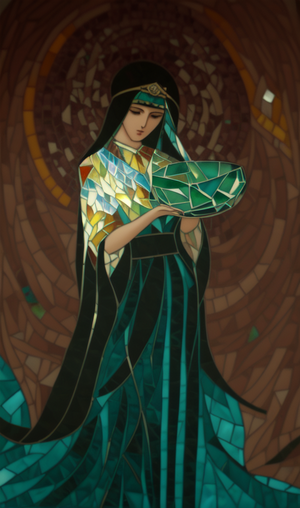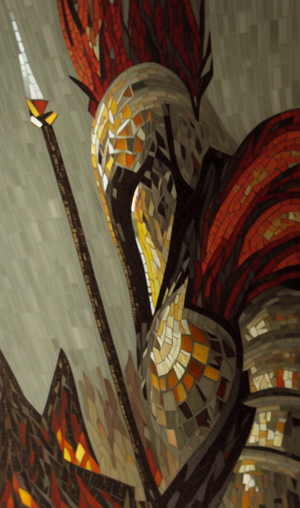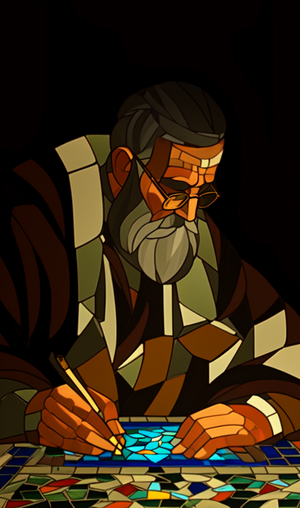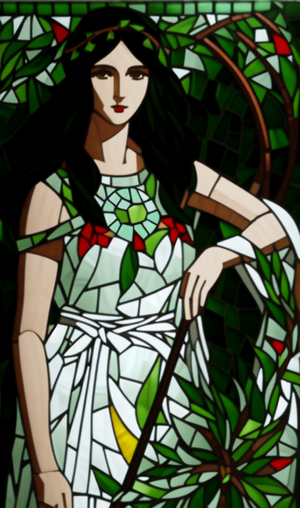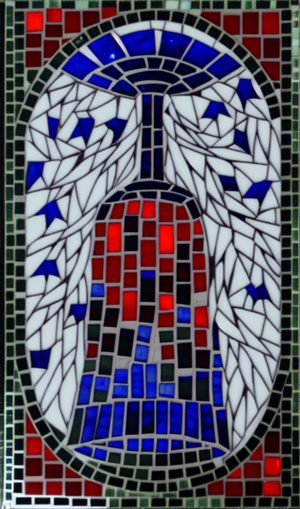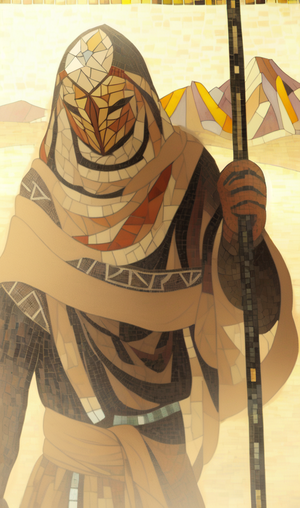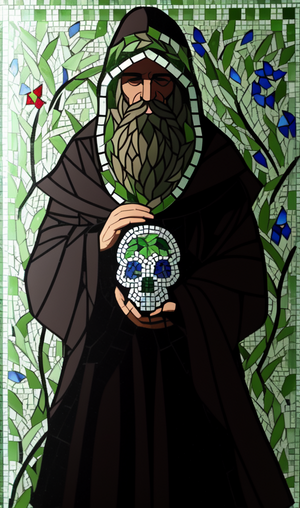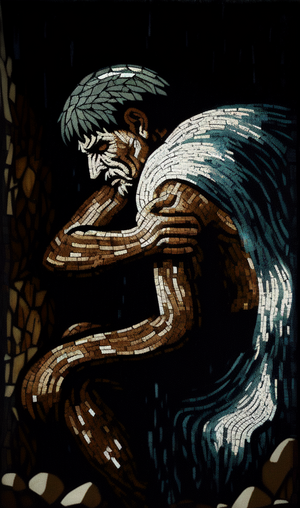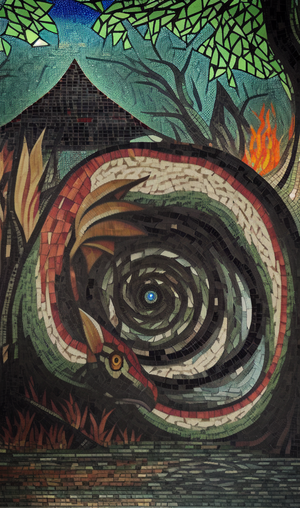Local Gods and Powers: Difference between revisions
| Line 23: | Line 23: | ||
*Spread the waters; its channels and tributaries are arteries of the world. | *Spread the waters; its channels and tributaries are arteries of the world. | ||
*Seek purity; to cleanse wickedness invigorates the spirit. | *Seek purity; to cleanse wickedness invigorates the spirit. | ||
<br> | |||
'''B’aara in the Sultanate''' | |||
<blockquote>The first spoke is the font of life and the patron of the line of Marib. She is the beginning of the Wheel and the rejuvenation of it as it turns. The B’aarat can be found among beggars and at court. It is an institution of vast wealth, but also of great charities. Her temples of water are ubiquitous across the Sultanate, some extravagant and others humble. The satrapies of the Sultan often appear about wellsprings, around which such temples are built, and sometimes serve as offices for their governors or Emirs. While many cultures upon the Great Disc outside the Sultanate may worship any spoke of the Wheel, most common are the cults of an analogue to B’aara. | |||
The sprawling Forum of the Limpid Pool, in the cool shade, is the navel of her church in Baz'eel, and a place of society, mingling, and reflection in the Golden City. The Chahar Bagh is the Sultan’s personal garden-sanctum, whose wondrous symmetry is based on the Mother’s ancient instructions, from which it is said he can see all of his domain through his own undisturbed image in the gazing pool. | |||
'''Her priests are expected to''' guide the great to altruism and administer their endowments, to empower protectors of peace, to lead embassies, to council leadership, to produce harmony, to exemplify grace, to provide shelter, to heal the sick and shattered, to exorcize the djinn, to be always decent and presentable, to chide the chafing and quell unrest, to prepare the community for hardship, to decorate holy places and worthy people, and to rescue the drowning and slake any thirst — water is life. | |||
Clerics of the B’aarat are known as, among other names, '''Waterbearer''' or '''Serene'''. The Many Mothers govern the faith and its many doctrines as a collective. The Godmother is the high priestess of the Wheel, who raises and instructs the Sultan’s family and anoints a succeeding Caliph or Sultan. | |||
'''She is prayed to''' when water is discovered in the Great Ash Desert, for dispelling mirages, for promotions or favors, when a pot shatters and when it is mended, when a child leaves the home, when the sun high and shade cannot be found, for the success of one’s peers, when opening negotiations, when witnessing suffering, to alleviate ailment, when thirsty, for stillness or clarity of mind, and when a toast is raised to the health of others. | |||
'''She is associated with''' wells and aquifers, miracles of healing, peace and accord, obedience and authority, diplomacy, decorum, tactful guile, bribery, the purification of water, the setar and other bright string or bow instruments, hygiene and ablutions, ceramics, petrichor, terracotta servants, silk and sable, citrus and melon, olive oil, soap, tubers, fish, waterfowl and cranes, lotus, fresh clay, introspection, vanity, social status, scrying, pregnancy and children, magnanimity and charity, grandeur, protection from the sun, the water of the Edutu, the lineage of Marib, the right of Emirs, Caliphs, and Sultans, and the light of the moon. | |||
By other names she may be known as The Sable Cloak, al-Umm, The Assurance, Clarified B’a, Nest-of-Eagles, The Deep Table, Silver-the-Moon-Tear, The Staying Palm, Comportmenta, Her Significance, and Our Peace.</blockquote> | |||
'''Among her holy days are:''' | |||
<blockquote>'''The Great Feast of B’aara''' — A solemn but sumptuous holiday of the Mother and her kin; the greatest feast in the Sultanate. The day is begun with thorough washing and ablutions. People dress in their finest, and days of prepared meals and months of stocked bottles are set out and enjoyed with decorous splendor in festooned halls, palaces, and salons. It is a time of seeing and being seen. The pious among the Mother’s faithful spend the day serving this meal to the bereft in the open markets or the almshouses. For the vain it is a game to see how engorged and inebriated one can become without losing face. Then the B’aarat lead the revelers in hours and hours of prayer and dedications to the Mother, excoriating any who fail to make it through. The ceremonies conclude with rejuvenating blessings of the waters and all their sources.<br>'''Subat 15th''' | |||
'''Sina’s Night of Lamentation''' — Remembrance of an ancient saint, Sina, who was once shunned for bringing B’aara's purpose and quenching to the ignorant. Rough-spun robes and hoods and donned, and the people ask to be forgiven — not for personal failures, but for the whole culture’s myriad transgressions, as a whole. Those who can make the journey are guided by the Waradim to a holy site known as Umm’el, where tears are shed.<br>'''Nisah 9th''' | |||
'''The Emir’s Parade''' — The celebration of Salhin, the Eagle. This is a day of gaiety, and pomp is prepared all year. Even the poorest satrapies spangle their huts with dyed flags. Everyone is encouraged to don their best and refine their most captivating stories to tell. On rare years, the Sultan will lead the parade in-person across the Exodus with a vast train, guarded by the First Legion.<br>'''Qdim 29th''' | |||
'''Mumusha’s Fastdays''' — When one may only drink water, and eat a fist-sized portion of meager nourishment at noon. Inaugurated by a pious Sayyida of old times, the three days of fast are observed by most, as a honing of the will and an especial observance of each of the Wheel’s aspects; whereon each day, in succession, three of the spokes are given particular reverence, except B’aara who is regarded again at the end of the third day by the famished who are reminded of humility. It seals the Mother's power over the Wheel.<br>'''Adar 1st through 3rd'''</blockquote> | |||
'''Among the faithful, they say:''' | |||
<blockquote>“Our hands hold what’s poured.” — An affirmation of faith and assurance of responsibility. | |||
“The sweet well settles.” — Observing things falling into place. | |||
“Precious sable, cover.” — A prayer for protection / An exclamation of scandalization. | |||
“Weep into the dry clay.” — Improve a situation, especially in sacrifice / Create beauty from the base. | |||
“Worry Her not.” — A request to not act intemperently. | |||
“Time and water.” — Prevail through patience over especially dense obstacles.</blockquote> | |||
<br> | |||
==The Warrior, Agaslakku== | ==The Warrior, Agaslakku== | ||
Revision as of 18:16, 6 May 2024
The Wheel
In this faraway place and time, only the gods of the Wheel are known to answer prayers. To cast spells, newly created clerics (and other strict adherents) must have the proper name of their patron in their deity entry. As examples, "The Mother, B'aara" or "The Warrior, Agaslakku" will correctly align a cleric. Similarly, your primary and secondary domains must align with those of your patron.
They are said to be woven into the very foundations of the world.
The Mother, B'aara
Primary Domains: Water, Creation, Good, Halfling
Secondary Domains: Protection, Healing, Repose, Suffering, Nobility
Worshipers: Parents, Healers, Ascetics, Water-Carriers, Knights, the Afflicted, Sultans
B'aara, the God of Water, is broadly understood to be the reigning Overgod of the Wheel and is thus symbolic of the pantheon itself. She said to have created the River Edutu so essential to life in the desert, and of all the gods it is her clergy that are most closely associated with the Sultanate.
The Tenets of the B'aarat are as follow:
- Protect life; its beauty springs life from desolation.
- Aid the weak; their reborn vigor shall strengthen us all in turn
- Quench the thirsty; any claimed by the furious heat of Pra’raj are forever lost.
- Tend to the dying; once atime they tended to thee.
- Spread the waters; its channels and tributaries are arteries of the world.
- Seek purity; to cleanse wickedness invigorates the spirit.
B’aara in the Sultanate
The first spoke is the font of life and the patron of the line of Marib. She is the beginning of the Wheel and the rejuvenation of it as it turns. The B’aarat can be found among beggars and at court. It is an institution of vast wealth, but also of great charities. Her temples of water are ubiquitous across the Sultanate, some extravagant and others humble. The satrapies of the Sultan often appear about wellsprings, around which such temples are built, and sometimes serve as offices for their governors or Emirs. While many cultures upon the Great Disc outside the Sultanate may worship any spoke of the Wheel, most common are the cults of an analogue to B’aara.
The sprawling Forum of the Limpid Pool, in the cool shade, is the navel of her church in Baz'eel, and a place of society, mingling, and reflection in the Golden City. The Chahar Bagh is the Sultan’s personal garden-sanctum, whose wondrous symmetry is based on the Mother’s ancient instructions, from which it is said he can see all of his domain through his own undisturbed image in the gazing pool.
Her priests are expected to guide the great to altruism and administer their endowments, to empower protectors of peace, to lead embassies, to council leadership, to produce harmony, to exemplify grace, to provide shelter, to heal the sick and shattered, to exorcize the djinn, to be always decent and presentable, to chide the chafing and quell unrest, to prepare the community for hardship, to decorate holy places and worthy people, and to rescue the drowning and slake any thirst — water is life.
Clerics of the B’aarat are known as, among other names, Waterbearer or Serene. The Many Mothers govern the faith and its many doctrines as a collective. The Godmother is the high priestess of the Wheel, who raises and instructs the Sultan’s family and anoints a succeeding Caliph or Sultan.
She is prayed to when water is discovered in the Great Ash Desert, for dispelling mirages, for promotions or favors, when a pot shatters and when it is mended, when a child leaves the home, when the sun high and shade cannot be found, for the success of one’s peers, when opening negotiations, when witnessing suffering, to alleviate ailment, when thirsty, for stillness or clarity of mind, and when a toast is raised to the health of others.
She is associated with wells and aquifers, miracles of healing, peace and accord, obedience and authority, diplomacy, decorum, tactful guile, bribery, the purification of water, the setar and other bright string or bow instruments, hygiene and ablutions, ceramics, petrichor, terracotta servants, silk and sable, citrus and melon, olive oil, soap, tubers, fish, waterfowl and cranes, lotus, fresh clay, introspection, vanity, social status, scrying, pregnancy and children, magnanimity and charity, grandeur, protection from the sun, the water of the Edutu, the lineage of Marib, the right of Emirs, Caliphs, and Sultans, and the light of the moon.
By other names she may be known as The Sable Cloak, al-Umm, The Assurance, Clarified B’a, Nest-of-Eagles, The Deep Table, Silver-the-Moon-Tear, The Staying Palm, Comportmenta, Her Significance, and Our Peace.
Among her holy days are:
The Great Feast of B’aara — A solemn but sumptuous holiday of the Mother and her kin; the greatest feast in the Sultanate. The day is begun with thorough washing and ablutions. People dress in their finest, and days of prepared meals and months of stocked bottles are set out and enjoyed with decorous splendor in festooned halls, palaces, and salons. It is a time of seeing and being seen. The pious among the Mother’s faithful spend the day serving this meal to the bereft in the open markets or the almshouses. For the vain it is a game to see how engorged and inebriated one can become without losing face. Then the B’aarat lead the revelers in hours and hours of prayer and dedications to the Mother, excoriating any who fail to make it through. The ceremonies conclude with rejuvenating blessings of the waters and all their sources.
Subat 15th
Sina’s Night of Lamentation — Remembrance of an ancient saint, Sina, who was once shunned for bringing B’aara's purpose and quenching to the ignorant. Rough-spun robes and hoods and donned, and the people ask to be forgiven — not for personal failures, but for the whole culture’s myriad transgressions, as a whole. Those who can make the journey are guided by the Waradim to a holy site known as Umm’el, where tears are shed.
Nisah 9th
The Emir’s Parade — The celebration of Salhin, the Eagle. This is a day of gaiety, and pomp is prepared all year. Even the poorest satrapies spangle their huts with dyed flags. Everyone is encouraged to don their best and refine their most captivating stories to tell. On rare years, the Sultan will lead the parade in-person across the Exodus with a vast train, guarded by the First Legion.
Qdim 29th
Mumusha’s Fastdays — When one may only drink water, and eat a fist-sized portion of meager nourishment at noon. Inaugurated by a pious Sayyida of old times, the three days of fast are observed by most, as a honing of the will and an especial observance of each of the Wheel’s aspects; whereon each day, in succession, three of the spokes are given particular reverence, except B’aara who is regarded again at the end of the third day by the famished who are reminded of humility. It seals the Mother's power over the Wheel.
Adar 1st through 3rd
Among the faithful, they say:
“Our hands hold what’s poured.” — An affirmation of faith and assurance of responsibility.
“The sweet well settles.” — Observing things falling into place.
“Precious sable, cover.” — A prayer for protection / An exclamation of scandalization.
“Weep into the dry clay.” — Improve a situation, especially in sacrifice / Create beauty from the base.
“Worry Her not.” — A request to not act intemperently.
“Time and water.” — Prevail through patience over especially dense obstacles.
The Warrior, Agaslakku
Primary Domains: Fire, Chaos, Law, Orc
Secondary Domains: War, Planning, Protection, Strength, Metal, Tyranny
Worshipers: Soldiers, Barbarians, Bandits, the Thousand Clans, Rulers, Slavers, Bards, Veterans
Agaslakku, the God of War, is the patron of soldiers. He is viewed as a prodigal brother, as Ashfolk culture strictly rejects violence, but is nonetheless seen as an important protector. His clergy largely consists of Janissaries and outlanders.
The Tenets of the Agasians are as follow:
- Make war; battle tempers the flesh and strengthens resolve.
- Reap the spoils; a warrior's fortunes are made upon the field.
- Keep the faith; the devout warrior claims victory from defeat.
- Where an Axe is broken, return it to the earth so that it might join its worthy kin.
- Die well; in death be revered by your brothers.
- Record the glorious; their tales may be remembered for eternity.
‘’’Agaslakku in the Sultanate
Agaslakku is a mighty pillar of the Sultanate. While to the civilized he is an abstraction or uncouth necessity, he is the recognized deliverer of any kind of courage or strategy. Though by no means disorganized, it is customary that his cult conducts their rites outside of the gaze of society. Agasians, while brazen in their acts, are quite disciplined about their secrets, kept unto death. The Warrior’s only truly public temple, The Marching, is found within the grounds of the Janissaries’ headquarters in Baz’eel, where sonorous and ghastly hymns to struggle, heard at dawn, cause nearby windows to shutter. When a legion returns to the gates of the Golden City, the Klaxon's Horn, made of shining copper, bellows at their welcome — heard from wall to wall — and twice to acknowledge a victory.
Though some legions worship certain spokes as special patrons, such as the Wroth among the Fourth and B’aara among the Second, Agaslakku is the god of the Sultan’s armies — and, often, the god of their enemies. Such is the agony holy to the Warrior.
His priests are expected to inspire resolve and ready, to mete out execution or mercy, to lead the formation or galvanize the commands of its appointed commander, to scrutinize and bless arms and equipment, to maintain loyalty and never divulge, to devise stratagems, to uncover ambuscades, to detect weaknesses and spread fractious rumor, to divide spoils judiciously, and to glorify the worthy in death — they will be remembered in song.
Clerics of the Agasians are called, among other names, Warrior or Proud. Not much is known of the cult’s leadership; but it is seen when the Sultan’s Beys visit him in ceremony, the Kahraman emerges, bedecked in ancient armor, and stands between them holding a plate of smoldering embers.
He is prayed to for victory in struggle, for fear and rumor to spread through the enemy camp, for the discipline or friendship of the one next to you, for faultless materials or alloys, for the courage to do the unthinkable, for a clean flame by which to cook or see or warm oneself, against rust or patina, when honing or polishing, for good preparedness against danger, and for strength in chronic malady, painful hardship, or harsh calumny.
He is associated with the hegemony of the Sultanate, metallurgy, the blacksmith’s art, strategy, unwaveringly loyalty, legends and praise, insult, coups, command, horsemanship, bulls, hawks, hounds, the Janissaries, the Thousand Clans, courage in the face of suffering and fear, braggadocio, self-aggrandizement and boast, fortifications, the nafir and other horns, soldiers’ pay, salt, cured meats and fish, the roasting spit, hunting and sport, unsolvable problems, and the blood of centuries that, in the ground, becomes iron.
By other names he may be known as The Broken Axe, Agasius-Arrowsnap, The Klaxon, The Shield-Shattered, Ossu-Unbelievable, al-Fa’is, The Unheeded Plea, The Advance, Brand-Bent Agaslakku, The Dent, or Clasp-of-Bronze.
Among his holy days are:
Vahd’s Triumph — A parade of the Legions in regalia, led by Warriors in red splendor. Spoils of war are put on display, and silver is thrown to the crowds by officers. Often, a mighty beast is sacrificed at nightfall and priests of Kula read its entrails for glory. Mock battles, usually with maniples led each by a Warrior in sacramental garb, are performed as displays of courage, sacred to the second spoke. The local Warrior most victorious in these games is gifted a Diadem of Triumph, to be worn until the next year’s contests.
Maribeh 2nd
The Uncensured Coals — On these days, the Agasians light a great fire with as much fuel as can be mustered. Without adding more fuel, they must extend the life of the coals as they burn down with great perseverance and attention. The bravest will start the conflagration they will attend in the wilderness, and welcome whatever predator drawn to it, so they may defend their embers. Weapons forged on this holiday are blessed by Agaslakku.
Iyar 18th and Qdim 18th
Galim’s Feastday — A day when the dead are given special reverence. The Agasians are known to appear with game on spits, and alamedas become rich with the smell of smoking meat. They recite and elaborate on the deeds of heroes and companions to the public during this holiday.
Illul 28st
Among the faithful, they say:
“What is broken…” — An affirmation of faith, if the second part of this phrase is said in response.
“Ply the tin and copper.” — To make extraordinary the ordinary / To improve lesser circumstances.
“Dislodge your axe.” — Let what is beneath one pass / To show mercy.
“Go under the spears.” — Find a different strategy or approach.
"Boots break the fang.” — To ready against some sudden misfortune.
"Water Bel-Ishûn." — To do battle / To shed blood.
The Magi, Izdu
Primary Domains: Magic, Law, Earth, Stars
Secondary Domains: Planning, Trade, Knowledge, Fate, Spells, Time, Rune
Worshipers: Academics, Chroniclers, Poets, Astronomers, Geomancers, Archeologists
Izdu, the God of Wisdom, is second only to B’aara herself. He is considered the wellspring of Ashfolk civilization and culture. His clergy are known to populate the great academies of Baz’eel.
The Tenets of the Izdur are as follow:
- Seek knowledge; true enlightenment is found through understanding.
- Tutor the ignorant; spread the light of wisdom to the dark corners of the world.
- Protect the word; knowledge lost is a grave sin.
- Record insights; truth is found in the broadest mind.
- Scribe chronicles; the present contains the lessons of the future.
- Create wonders; your mark on the world should be felt by all.
- Observe the stars; their light and secrets, though dangerous, offer knowledge to the wary.
The Wyld, Kula
Primary Domains: Storm, Earth, Air, Creation
Secondary Domains: Sand, Moon, Blood, Decay, Spider,
Worshipers: Druids, Farmers, the Poor, Radicals, Gardeners, Shepherds, Botanists
Kula, God of Nature and Life, is specifically associated with Bel-Ishȗn and Edutu. Her gardens fill Baz’eel, and she is considered the protector of all living things. Her clergy are decentralized across a network of gardens, sanctuaries, and radical organizations.
The Tenets of the Kulamet are as follow:
- Tend growth; things that grow bring life to the world, fed by the Mother’s tears.
- Feed the earth; the Wyld smiles when the land’s belly is full.
- Cultivate flocks; animals are beloved of me, and she desires that they multiply.
- Gift alms to the impoverished; the poor are her children. She is pleased when they are tended to.
- Oppose elites; potentates and rulers are the cause of the land’s suffering. Their power must be limited.
- Shelter grove-tenders; the gardeners of the wild are beloved of her, offer them friendship and protection.
- Maintain Bel-Ishûn; the jungle is her garden, and it is holy. Its sanctity must be maintained.
The Sabotage, Gellema
Primary Domains: Stars, Chaos, Evil, Magic
Secondary Domains: Luck, Trickery, Illusion, Darkness, Charm, Knowledge, Poison
Worshipers: Liars, Conspirators, Spies, Sooth-Sayers, Charlatans, the Seditious, the Mad, Drunks, Drug Eaters, & other Peripherals
Gellema, God of Trickery, Deceit and Hedonism, is respected as a safeguard against ill will. Their clergy mostly operate underground, in ale-houses and brothels, apart from a few glistening official temples. In the moon, among the stars, between clouds, within branches, on the muddy banks, upon the cliffside — children, the sick, and the sensitive point at the eyes and mouth they see there and utter Gellema. It is said secret and tantalizing rites take place under its gaze.
The Tenets of the Gellemedes are as follow:
- Foster obscurity; the unknown fosters more fear than the known.
- Mislead the truthful; truth is the light that banishes the shadows, divert its gaze elsewhere.
- At dusk aren’t shadows, and the gleaming moon casts no ray.
- Spread mistrust; those allies that do not trust each other are less inclined to look upon you too deeply.
- Hoard secrets; knowledge is power and hidden knowledge gives you power over others.
- Write over graven words. Burn the letter.
- Convince the certain of uncertainty.
- Memory is corrupt, history is death, seek continuously the immanent.
The Wanderer, Warad
Primary Domains: Air, Earth, Law
Secondary Domains: Travel, Trade, Protection, Sand, Sea
Worshipers: Nomads, Travelers, Merchants, Caravaneers, Messengers, Explorers
Warad, God of Travel, is the protector of all who walk the sands. He is said to forever wander the desert, and many sightings are reported each year. His clergy tend to populate taverns and way-stations; They are not a wealthy faith.
The Tenets of the Waradim are as follow:
- Protect the borders; turn back invaders that threaten your people.
- Carry messages; spread tales and knowledge of the roads and sanctuaries.
- Aid travelers; defend them on the road, and watch over their passing.
- Seek new roads; new paths bring prosperity and protection for travelers.
- Defy thieves and bandits; the borders must be guarded lest danger run rife.
- Tend the shrines; their sanctity must be ensured. They are a place of sanctuary, and protection.
The Martyrs, Kalim & Gamil
Primary Domains: Law, Good, Death, Earth
Secondary Domains: Trickery, Rune, Suffering, Fate, Repose, Metal
Worshipers: Mourners, Traditionalists, the Elderly, the Dying, Gravediggers, Tomb Guardians
Kalim & Gamil, the Gods of Death, are the kind-spirited protectors of the dead. The Temples of the Martyrs ring out with dirges and laments, and they tend to all the graveyards. Twins born under their gaze are considered blessed.
The Tenets of the Twindari are as follow:
- Mourn the dead; their lives should be celebrated and their part in the world remembered.
- Enact burials; lay the dead to rest in sanctified grounds, out of the reach of the wretched.
- Protect the sacred grounds; to break the sacred grounds is the greatest of sins.
- Sacrifice in need; the greatest blessing is to give yourself to ensure the fruition of a cause.
- Obey your elders; their wisdom is born of ages, and they know what is best.
- Collect secrets and knowledge of value, and teach them to the worthy.
The Wroth, Urazzir
Primary Domains: Evil, Death, Frost
Secondary Domains: Retribution, Undeath, Fate, Time, Hatred, Suffering
Worshipers: The Vengeful, Scorned, Betrayed, Cursed, Fearful, and Vindictive
Urazzir, the God of Vengeance, is the terrible hand of reckoning. His temples are frightful places where the wronged go to invoke vengeance against their enemies.
The Tenets of the Uzzarii are as follow:
- Do not allow a wrong to stand unanswered. Proclaim for justice, rally the people, stone the sinners.
- Curse your enemies; do not leave grave misdeeds forgotten; toil in recording horrible truth.
- Fear death, fear betrayal: attain control of these evils to belay their pains. Trust is not bound by blood, but respect is watered by it.
- All you love and abide by can be ruined in a single stroke. Rest with one eye open, and away from the warm comfort of the hearth. Be alert.
- You are required to root out evil if you foresee it, never assume innocence.
The Wyrm, Bashmu
Primary Domains: Fire, Evil, Chaos
Secondary Domains: Strength, Tyranny, Poison, Decay, Sea
Worshipers: Pariahs, the Melek, Megalomaniacs, Anathemic Cults, Sibilant Collaborators, Sailors, the Power Hungry
...
The Tenets of the Bashmu-kar are unknown.
...but some whisper a scant few, none certain...
- That the Wyrm empowers the ambitious.
- That the Wyrm is a patron of monsters, and cannibals.
- That it is a patron of the defeated, downtrodden, contrarians and the rebellious.
- That Serpents are sacred, and lizards love the Wyrm
- That it is a curse to speak or hear the name Bashmu
Details about The Wyrm can be (and are best) discovered in-game. Characters with this God in their deity field may find they can access unique dialogue options and content.
The Dome
The Way of the Divine Dome” is a monotheistic faith with pantheistic elements that is primarily located in the floating city of Il Modo.
It is the second pantheon that is active in EFU: Sands of Intrigue. Clerics of the Dome must choose / worship a particular Patron Sage (listed below). Each Sage has a particular dogma, agenda, and flair that your character should engage with. It is assumed that clerics of the Dome exists in a formal Modini hierarchy of the followers of each particular Sage.
The “Dome Faith” lacks local NPC support in the areas surrounding Ephia’s Well. Unlike the Pantheon of the Wheel, it is not a local religion and should be represented by a minority of characters.
For a Cleric of any of the Sages to cast spells of Circle 4, it is necessary to conduct a pilgrimage back to Il Modo and purchase / receive a relic from representatives of your Sect. In order to cast spells of Circle 5, it is necessary to have further demonstrated and proved to the Church / your NPC superiors that you are worthy of advancing in the ranks. This can be done through a DM application or through a NPC possession. Level 9 Clerics seeking a relic must have had a substantive impact pushing their Sage’s agenda in order to be entrusted with this advancement. Playing a Priest of the Divine Dome is not intended to be an easy experience.
The Way of the Divine Dome draws from a variety of fictional and non-fictional inspirations and players should be mindful to carefully portray something that is grounded, distinct and unique to EFU. If you wish to incorporate something drawn from an actual faith tradition please check with a DM to ensure that it is done tastefully and non-offensively
The faith of the Dome is rooted in cosmology. According to its tradition, the universe is composed of a single crystalline sphere that surrounds all things and is itself the source of all creation, time, and movement. It is this sphere (or Dome) that gives form, structure, and meaning to the universe. The world is but a speck (perhaps one of many specks) that floats suspended in the mysterious vapors of the Dome’s interior. The stars above, or Illuminations, are those souls that have ascended to the firmament above.
Particularly important Illuminations are believed to be the souls of past Sages who the Modini tend to revere & worship in a polytheistic manner.
Followers of the Dome believe in reincarnation. Souls are fated to be born and die in a constant state of repetition until a life has reached its highest potential for harmonic congruence with the Dome. What this means exactly is subject to considerable interpretation, frequently associated with one or another of the different Sages. When this true death is achieved; the soul ascends to become an Illumination (or Star) that is set into or adjacent the Dome itself. Truly great souls might ascend to become Sages themselves, and thus Illuminations of greater potency and glory.
While the movements and nature of the Dome itself transcends understanding, mortals seek guidance and blessings from the Nine Great Sages, each associated with with a particular Illumination (Star) above. The contemplation of the Dome itself is generally reserved only for philosophers and high-ranking Priests. The majority members of this faith are only dimly aware of the theology related to the Divine Dome, and instead simply pray to a Patron Sage as if it was a god.
It is customary for the people of Il Modo to choose a Patron Sage in their early adolescence. Praying to a Sage is considering the best way to bring success and avert misfortune in one’s current life. Pleasing one’s Patron Sage is also considered to be the best way to ensure that one’s future life is an improvement upon the present one. The Modini are a deeply hierarchical and aristocratic people and it is commonly believed that (for example) the Nobility enjoy their position in part because of pleasing a Sage in their former life. Followers of the Dome are always keen to advance their status both in their current life and (more importantly) in the next one.
It is also common for the followers of the different Sages to be in conflict with each other. Indeed, several Sages are considered to represent forces that are evil and sinister and associated with only a tiny minority of followers. Nevertheless, all Modini recognize that all the Sages are important historic and theological figures that deserve respect. Rituals and the making of offerings to the different Sages (as needed) are a common practice.
While the sects of each Sage are often in conflict, they do have occasional (secretive) conclaves where fundamental matters of the faith are determined. This includes, for example, the potential recognition of a new Great Sage. This is very rare. Cults worshipping or seeking to advance the recognition of a lesser Sage exist.
The central site for religious instruction for the most beloved Sages is the “The Dome of Man,” a large cathedral-dome complex located in Il Modo. It is a site for pilgrimage and contemplation, and is the most important locale of Il Modo. Those Sages that are more feared than loved are known to have smaller temples and sites of worship hidden throughout the sprawling city of Il Modo.
Astronomy is highly significant to followers of this faith. The approach is, however, thematically very different than the Orthodox Astronomy of Baz’eel or the Arcano-Scientific Astronomy of the followers of Q’tolip. Star-knowledge is heavily rooted on a more mystical / ritualistic approach.
The faith had its beginnings with the first Pilot-Prophet Sage Raffelo. He is believed to have discovered these fundamental cosmological truths and thus founded the Church of the Dome. From his teachings, a caste of Pilot-Priests began who are the core of the faith’s institutional hierarchy. As Il Modo itself is in constant untethered motion, floating here and there across the Sea of Pearls, it can be very difficult to find. The Pilot-Priests of Raffelo are experts in the study of the stars and applying their knowledge through rituals to be able to successfully chart a path through the sea’s treacherous waters.
The Pilot-Priests as a caste attempt to exert a monopoly upon all naval navigation. The riches received from this monopoly has been poured into works of great art and architecture; however it has also frequently led to corruption and decadence.
Sage Raffelo the Pilot-Prophet
Frameless Themes: Hierarchical Status / Knowledge / Law / Navigation
Primary Domains: Air, Water, Stars, Law
Secondary Domains: Sea, Knowledge, Travel, Planning, Nobility, Protection
Suggested Alignments: LG, LN, LE
Worshippers: Ambitious Pilot-Priests, politicians, wealthy nobles and their loyal servants, members of the Inspecta
The first and most important of the Sages. The Sage of those Pilot-Priests who climb the elaborate hierarchy of the Church. A Sage also for those who seek to play the Game of Knives and climb their way to the top of the Modini institutions. Also associated with the feared Inspecta, that order of inquisitors and investigators who function as Il Modo’s secretive spy service and religious police.
Clerical Titles: Pilot Priest, Esteemed Pilot-Priest, Eminent Pilot-Priest
Some Tenets of Sage Raffelo are as follow:
- Command your crew, if you do not have one then form one
- Obey your superiors and demand obedience from your inferiors
- Enhance the power and prestige of Il Modo
Sage Maribela de Fortuna
Frameless Themes: Luck / Adventure / Fishing / Fate
Primary Domains: Air, Water, Chaos, Stars
Secondary Domains: Sea, Creation, Luck, Protection, Trickery, Fate, Moon
Suggested Alignments: NG, CG, TN, CN
Worshippers: Eel fishers & hunters, sailors, laborers, adventurers, gamblers
A popular and beloved Sage associated with the luck of eel fishers just as she is with adventurers. Also generally frequently associated with the unpredictability of the sea. Maribela is the subject of many tavern tales and legends, always fishing for eels and going on wild adventures in order to feed her family.
Clerical Titles: Informal. Luckfisher, Fisher-Priest, Pilot-Priest, Cap’n, etc….
Some Tenets of Sage Maribela are as follow:
- Seek bold adventure, trust in your luck
- Stories of your deeds should be remembered by your friends
- Help others find their way through this life
Frameless Themes: Trade / Exploration / Skill / Magic
Primary Domains: Air, Water, Stars, Magic
Secondary Domains: Sea, Trade, Rune, Travel, Spells, Charm, Knowledge
Suggested Alignments: LG, LN, LE, TN, NE
Worshippers: Merchants, Explorers, the rare Modini wizard, also popular among less ambitious Pilot-Priests, Scholars….
Sage Markolo was a great trader and navigator who was instrumental in turning Il Modo into the naval trading power it later became. His merchant fleets brought great wealth and knowledge from distant places.
Clerical Titles: Pilot-Priest, Merchant-Priest, Scholar-Priest….
Some Tenets of Sage Markolo are as follow:
- Accumulate wealth and show it off
- Explore distant locales and enhance your knowledge of the world and its splendors
- Develop connections with other lands and peoples
Sage Vittoria the Admiral
Frameless Themes: War / Strength / Strategy / Honor
Primary Domains: Air, Water, Stars, Storm
Secondary Domains: Sea, War, Strength, Protection, Planning, Metal, Fate, Retribution
Suggested Alignments: LG, NG, LN, LE, NE
Worshippers: Soldiers, tacticians, sailors, warriors
Vittoria was a legendary Admiral who oversaw the conversion of the old Modini fishing and eeling fleets into a significant naval power. She was undefeated in battle and led Il Modo to become (for a time) the preeminent naval power of the sea. A statue of proud Sage Vittoria atop a column stands overlooking the plaza of the Dome to this day.
Clerical Titles: Captain-Priest, Admiral-Priest...
Some Tenets of Sage Vittoria are as follow:
- Victory through strength and strategy
- Enhance the military power of Il Modo
- Achieve the limits of your own personal might
Sage Giacomo the Artificer
Frameless Themes: Craft / Art / Creation / Madness
Primary Domains: Air, Stars
Secondary Domains: Sea, Knowledge, Metal, Rune, Planning, Destruction
Suggested Alignments: CG, NG, CN, TN, CE, NE
Worshippers: Inventors (non-Mechanists), Artists, Builders, Manufacturers, Lunatics
Giacomo the Artificer was a genius without parallel. His contributions to art, music, architecture, and simple craftsmanship seemed divinely blessed. How else to explain such genius? Yet he was also mad, and tended to burn much of what he produced, constantly dissatisfied. In addition to an enormous output of works of art, he designed the enormous ballast tank systems that keep Il Modo afloat. He also oversaw the construction of the Grand Duke’s Palace, the Dome of Man, and as a final project built ‘The Lamp of Learning,’ a towering university-lighthouse filled with bizarre traps and hidden secrets. He further developed advanced designs for arbalests, new naval vessels, cannons / bombards, and established the tradition of Workshops. Scraps of his notebook are eagerly sought after, and those paintings of his that remain are valued more than the palaces they are found in.
Clerical Titles: Artificer-Priest, Artist-Priest, Builder…
Some Tenets of Sage Giacomo are as follow:
- Create, build, and learn.
- Victory and success through your own understanding
- Trust not the mechanistic works of Qa'im, and the Dunes of Pra'raj, for those works pass beyond your understanding and are not the product of man
Sage Santina the Compassionate
Frameless Themes: Charity / Healing / Compassion / Good
Primary Domains: Air, Water, Stars, Good
Secondary Domains: Healing, Sea, Repose, Protection, Suffering
Suggested Alignments: LG, NG, CG, LN
Worshippers: Healers, the ill, the poor, the desperate, the compassionate, missionaries, ‘Lezrous’ paladins and knights
Plague and disease has long been one of the great banes of Il Modo. During the first great bout of the ‘Crimson Death’, Sage Santina and her followers were instrumental in tending to its victims. Adherents of Saga Santina also are the most enthusiastically evangelical about the faith of the Dome. They strongly believe that, for the sake of the harmony of the Dome as well as the fate of every soul, it is absolutely necessary to convert as many people as possible.
The sect of Sage Santina maintains an additional Knightly Order made up mostly of those who have suffered and survived the Crimson Death. “Lezrous” is an EFU-term (inspired by ‘Leprous’) to describe those who have suffered the ravages of the Crimson Death Plague. The “Order of the Lezrous Brethren” (or Lezerotti) are the defenders of the sect and those who are willing to go among the poor and diseased.
Clerical Titles: Sister-Priest, Brother-Priest, Healer-Priest…
Some Tenets of Sage Santina are as follow:
- Serve others, and put aside pride and ostentation
- Attend to the afflicted and needy
- Encourage others to join the faith
Sage Orlando of the Death Masque (Feared Sage)
Frameless Themes: Disease / Death / Intrigue / Art (acting, opera)
Primary Domains: Death, Evil, Stars
Secondary Domains: Sea, Trickery, Illusion, Retribution, Suffering, Charm, Hatred, Blood, Decay
Suggested Alignments: CN, LE, NE, CE
Worshippers: Courtiers, Assassins, the Depraved, Actors, those seeking vengeance
The Sage Orlando was a great performer, traveler, and courtier with a genius for intrigue and a taste for the grotesque. He toured the western Sea in a flotilla of courtiers and masked revelers, only to return and bring with them the plague of the Crimson Death, a flux that has never been truly stamped out from Il Modo. To follow Orlando is to be associated with many of the darkest characteristics of the Modini character: a dreadful fear of disease, adoration of beauty, a thirst for vengeance, and skill in intrigue
Clerical Titles: Informal. Shadow-Priest, Grotesque-Brother/Sister, etc
Some Tenets of Sage Orlando are as follow:
- Embrace the beauty and horror of life
- Spin webs of intrigue and master them
- Avenge yourself against those who slight you
Sage Barbarina of the Lost Armada (Feared Sage)
Frameless Themes: Storms / Necromancy / Underworld / Pirates
Primary Domains: Air, Water, Stars, Evil, Death, Storm
Secondary Domains: Sea, Darkness, Undeath, Hatred, Tyranny
Suggested Alignments: CE, NE
Worshippers: Doomseekers, Pirates, Necromancers, Drowned Skeletons, Cave Dwellers, and those seeking protection from them
According to legend, Barbarina was a charismatic young noble who was betrayed by her family’s enemies. She organized a flotilla of oppressed eel fishers and mutinous naval vessels and was for a time a menacing Pirate Queen that threatened to conquer Il Modo itself. Ultimately, she decided to lead her armada on a mad expedition into the Maelstrom - there are various tales and legends as to why. At any rate, the Armada was sucked into the darkness below. It is said that Barbarina and her Armada now inhabit the undersea and have even traveled to the Other Side, there to behold the horrors of the Underdome.
To follow the Sage Barbarina is considered too dangerous by the authorities and Inspecta of the Dome of Man (Church). It is therefore a forbidden cult, although she is nonetheless offered fearful prayer by many and adopted as a Patron by some. The people of Il Modo have a particular terror of underwater, underground places, the undead, and absolute darkness in part because of frightening tales told about Saga Barbarina and her Lost Armada.
Clerical Titles: Informal. Pirate-Priest, Dread-Captain, etc…
Some Tenets of Sage Barbarina are as follow:
- Form your crew from the living and unliving alike
- Claim the dark and dank places of the world for Barbarina, and drive out those other horrors that exist
- Bring passionate terror and fear to all, its good for them
- Revel and enjoy the evil path you have chosen
The Unknown Sage
Frameless Themes: Mystery
Primary Domains: Unknown
Secondary Domains: Unknown
Suggested Alignments: ?
Worshippers: ?
The identity of the Ninth and Unknown Sage is a secret that is maintained by the highest ranking members of each sect of the Way of the Dome. There are many speculations as to who it might be, but it is not known who or why all the Priests are so universally aligned with declining to identify the identity of this Greater Sage.
Players may not play cleric followers of the Unknown Sage at this time
Clerical Titles: Unknown
The Tenets of the Unknown Sage:
- ???
